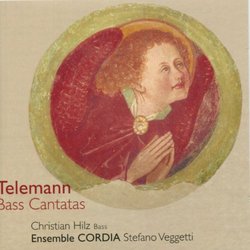| All Artists: Telemann, Hilz, Ensemble Cordia, Veggetti Title: Bass Cantatas Members Wishing: 0 Total Copies: 0 Label: Brilliant Classics Original Release Date: 1/1/2010 Re-Release Date: 2/9/2010 Album Type: Box set Genre: Classical Styles: Historical Periods, Classical (c.1770-1830) Number of Discs: 3 SwapaCD Credits: 3 UPC: 842977039405 |
Search - Telemann, Hilz, Ensemble Cordia :: Bass Cantatas
CD Details |
CD ReviewsSomeone Should Write a Double Biography ... Giordano Bruno | Wherever I am, I am. | 08/05/2010 (5 out of 5 stars) "... of Georg Phillipp Telemann (1681-1767) and Georg Friedrich Händel (1685-1759)! [But don't look at me! I'm a tootler, not a scribbler. Besides, I'm as indolent as an ichthyosaur in a fossil bed.] Not only were they close contemporaries with a common musical idiom of the high Baroque, whose music was well known to each other, but their careers were full of parallels. Both were immensely prolific, and both in instrumental as well as vocal genres. Both continued to innovate and to respond to musical developments -- new tastes, new forms, new instruments -- into their last decades of life, when both produced astonishing masterpieces. Both wrote much of the most profound music in the genre of the 'Biblical' oratorio with voices and orchestra. Both were pioneers in musical entrepreneurship, staging their own public concerts and selling tickets.
There were of course salient differences. Telemann was a good deal more successful and secure financially, and stayed ensconced within Protestant Germany, while Händel emigrated first to Italy and then to England, eagerly adapting and adopting musical influences of both cultures. Händel was surely the greatest Italian composer born north of the Alps of his epoch, and his Roman cantatas, patronized by the Catholic Humanist aristocracy but employing texts that are not overtly religious, represent a variety of themes that were not available to Telemann in pious Protestant Germany. Telemann also turned abroad, however, to expand his musical language, so that one might likewise call him the greatest French composer of 18th C Germany. And there have been differences in the fate of the two composers in later generations. With The Messiah, Händel achieved a unique perennial status in the English-language musical world, while Telemann fell into almost total neglect through the 19th C. Apart from The Messiah, the earliest modern attention to Händel was directed to his resounding Fireworks and Water-Music, and then to his operas, all performed on modern instruments with late romantic inflections. Telemann's instrumental works never suffered that indignity; the revival of Telemann has occurred entirely within the "Early Music" movement toward historically informed performances on original instruments. This CD, performed by the instrumental ensemble Cordia with basso Christian Hilz, is in effect a concert program, carefully selected to display the range of Telemann's genius across the decades of his long life. The "Serenata Deutschland grünt und blüht" is known to have been performed in frankfurt in 1716, while the "Ouverture in D major" was one of Telemann's last compositions, around 1765. The Wasser Ouverture "Storming Aeolus" was premiered in 1723, at the beginning of Telemann's long tenure as the musical "kingpin" of Hamburg. Ensemble Cordia is a youthful bunch, as one can see in their photo included in the liner notes. Thus they are of the generation of instrumentalists conservatory-trained in historical practices, playing technically 'mature' facsimiles of original instruments. Their performance is extremely polished. The three cantatas for bass solo and instruments chosen for this 'concert' also represent different stations of Telemann's career in place as well as time. "Die Gnadenthüre steht dir offen" was composed last, perhaps in the 1740s, and is the most obviously "French" in style; singer Christian Hilz renders his arias with ornaments and inflections that would have seemed tasteful to Rameau and Rameau's successors in Paris. "Herr, erhöre meine Stimme" dates from sometime before 1722, and "Ach Herr, lehr uns bedenken wohl" might have been composed as early as 1710. Both are plainly within the tradition of German cantatas intended for Sunday worship, the tradition in short of all the cantatas of JS Bach. Telemann wrote them for the kind of musical forces available in ordinary German churches, and he artfully eschewed the sort of virtuosity that would not have been accessible, but an absence of virtuosic display does NOT imply any lack of musical inspiration or affective power. None of these three cantatas was included in any of the "full year cycles" that Telemann published, and none of them has been previously recorded. Over 1000 cantatas by Telemann have been identified, by the way, and given their intimate scale, these three are among the finest I've heard. Let's call this the "Must Buy CD" for the month of August, 2010! But beware of the Big River! This is a single CD, not a set of three. Even so, the price is modest." |

